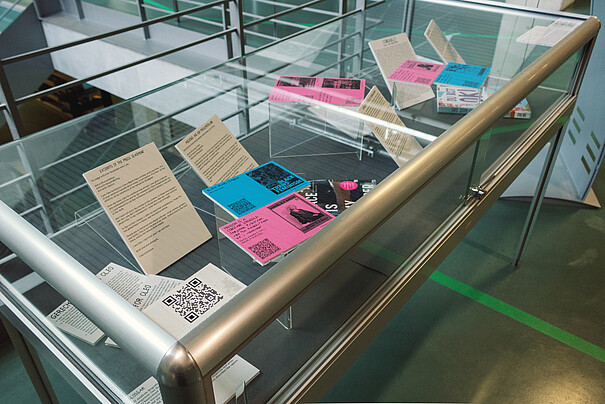![[Translate to English:] Foto: Anita Nguyễn [Translate to English:]](/fileadmin/_processed_/e/8/csm_A_250618Pride-Month_in_der_UdK-BibliothekIMG_1085-Bearbeitet_lowres_c920af4e67.jpg)
Contact points and places in Berlin
Selection of contact points in Berlin
The Caribbean-American “Black, lesbian, feminist, socialist, mother, warrior, [and] poet” Audre Lorde taught at the John F. Kennedy Institute of the Free University of Berlin in 1984, inspiring an entire generation of Black German authors. In the spirit of her quote: “Your silence will not protect you.”
At the suggestion of Audre Lorde, who encouraged May Ayim and Katharina Oguntoye to publish a book, “Farbe bekennen” (Showing Our Colors) was created, which is still considered a standard work of the Afro-German women’s movement today and was the first book to describe the everyday racist experiences of Black people in Germany. “Farbe bekennen” catalysed the founding of the associations ISD Bund e.V. and ADEFRA e.V., which continue to significantly contribute to the Black movement in Germany.
May Ayim was an Afro-German poet, educator, activist and co-founder of ISD Bund e.V. Although she is known for her sociopolitical poems and essays—which relentlessly critiqued racism and contemporary German society—Ayim’s writings were also always full of love and longing.
Katharina Oguntoye is an Afro-German writer, historian, activist and co-founder of ISD Bund e.V. and Adefra e.V. The association Joliba e.V., which she founded in 1997, has been supporting Black people, children and their families of African, Afro-German and African-American descent.
In her autobiographical work “Daheim unterwegs” (At Home on the Road), author, activist, lecturer, artist and co-founder of ADEFRA Ika Hügel-Marshall recounts a life marked by experiences of racism and the exploration of her lesbian identity—a literary act of self-empowerment and survival.
In 1988, the first issue of “Afrekete” (named after a West African goddess of independence) was published, a magazine of the ADEFRA association, which was mainly produced by lesbian Afro-German or Black German women. The publication created a space for collective exchange, creative expression, resistance and healing.
Today, numerous Black queer authors are continuing this legacy. SchwarzRund, author and workshop leader, weaves queer desire, diaspora experiences and neurodivergent perspectives into a radical form of storytelling in novels such as “Biskaya”. Sharon Dodua Otoo, writer and political activist, writes in German about Black female characters beyond normative perceptions of time and body—showing queerness as a political concept in the process. Olumide Popoola, a Nigerian-German writer, artist and lecturer, also deals with identity, migration and queer life between London and Berlin in her genre-crossing literary works. Author, editor and process facilitator Chantal-Fleur Sandjon brings a lyrical coming-of-age story to the world of young adult literature with “Die Sonne, so strahlend und Schwarz” (The sun, so radiant and Black)—a Black queer story full of tenderness, self-discovery and resistance. These authors are actively shaping contemporary German-language literature with queer, Black perspectives and encouraging future generations to share their stories.
![[Translate to English:] Foto: Anita Nguyễn [Translate to English:]](/fileadmin/_processed_/e/8/csm_A_250618Pride-Month_in_der_UdK-BibliothekIMG_1085-Bearbeitet_lowres_c920af4e67.jpg)
Selection of contact points in Berlin

The stories of Cleo and Consuelo
During Pride Month, the UdK Library presents a diverse exhibition exploring LGBTQIA+ history, culture, and literature with a focus on Berlin.